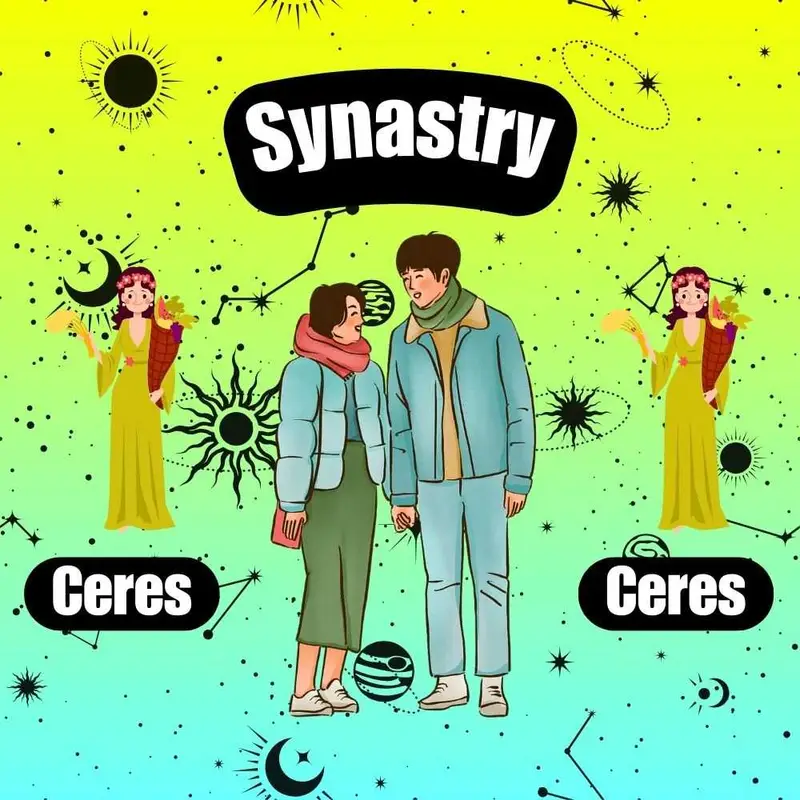Ceres-Ceres Aspects in Synastry
“The strength of the forest is each tree. The strength of each tree is the forest.”
Wise Cultivator

Disclaimer: This article represents a few interpretations among countless interpretations of synastry. For a deeper understanding, check out my comprehensive list of synastry aspects.
Ceres Conjunct Ceres Synastry
With Ceres conjunct Ceres synastry, you’re like each other’s mother. You can intuitively understand each other’s emotional needs and provide unconditional support.
This is a loving bond centered around mutual nurturing. You want to feed each other’s stomachs, minds, and souls. But your caretaking can also extend to the world around you, such as through gardening, environmental causes, and community support.
You can make each other feel safe. You can build a warm environment for each other’s inner child to come out and play. Past issues with your parents can be healed. You can re-parent each other, providing emotional security and affection where once were lacking.
This aspect can also highlight your shared values around food and nutrition. Your intimacy can be deeply strengthened through shared meals.
Ceres Sextile Ceres Synastry
With Ceres sextile Ceres synastry, you don’t just nurture each other; you can motivate each other to become better caregivers. You can understand each other’s needs, feed each other’s soul, and know how to make one another feel safe.
Where one person excels in providing emotional sustenance, the other can be adept at financial/practical caregiving. One may nurture through words of affirmation, while the other may show love through acts of service.
Together, you can create a buffet of care that caters to all the love languages. It’s the perfect balance of “I’ve got your back” and “I know you’ve got mine.”
But your nurturing isn’t entirely physical. You can nurture your minds with great thoughts. You can nurture your thoughts with great actions. And you can nurture your actions with consistency.
Read more: Esoteric Astrology (12 Classes – Free)
Ceres Square Ceres Synastry
With Ceres square Ceres synastry, you may have distinct approaches to caregiving. One might be the type to coddle, while the other might believe in tough love. One might show affection by cooking meals, while the other might express care through intellectual conversations.
This can lead to some conflicts about what it means to truly nurture each other. It’s not that you don’t care for your partner—it’s that you care in different ways.
Ceres-Ceres square can also bring to light your unresolved issues around nourishment from the past. Your childhood experiences with caregiving, whether positive or negative, can strongly influence how you nurture each other now.
Communication about your nurturing needs and boundaries is crucial, but it doesn’t come easily. You may find it hard to express your vulnerabilities and ask for support.
Ceres Trine Ceres Synastry
With Ceres trine Ceres synastry, you can selflessly nurture each other without thinking about who provides and who takes. You can give each other the seeds of compassion, knowing that every seed holds the potential to become a mighty tree.
Each person may just know what to do to make the other feel cared for, whether it’s a warm meal or a simple hug. You can also keep each other’s health habits on track, such as monitoring each other’s sleep, nutrition, and stress levels.
Together, you can cultivate peace in life’s simple pleasures. Your shared habits can create a strong sense of permanence.
If you have children, your parenting philosophies can also match well. You can agree on disciplinary styles and the values you want to teach your kids.
Ceres Opposite Ceres Synastry
With Ceres opposite Ceres synastry, your approach to family life, child-rearing, or even caring for the community can clash. You may have different values about nurturing. You may either over-nurture or under-nurture each other.
Food can sometimes turn into a weapon of mass affection. But you may struggle with obesity if you overdo it.
You may also find it difficult to meet each other’s true needs. Nurturance can become a competitive sport if you keep scores on how many times you support one another.